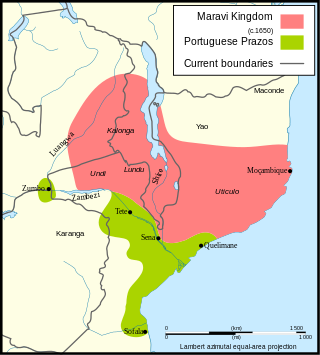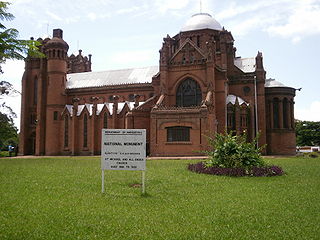
Malawi, officially the Republic of Malawi, is a landlocked country in southeastern Africa. It is bordered by Zambia to the west, Tanzania to the north and northeast, and Mozambique to the east, south and southwest. Malawi spans over 118,484 km2 (45,747 sq mi) and has an estimated population of 19,431,566. Malawi's capital is Lilongwe. Its second-largest is Blantyre, its third-largest is Mzuzu and its fourth-largest is its former capital, Zomba. The name Malawi comes from the Maravi, a name for the Chewa people who inhabit the area. The country is nicknamed "The Warm Heart of Africa" because of the friendliness of its people.

Zambia, officially the Republic of Zambia, is a landlocked country at the crossroads of Central, Southern and East Africa, and is typically referred to as being in Southern Africa at its most central point. Its neighbours are the Democratic Republic of the Congo to the north, Tanzania to the northeast, Malawi to the east, Mozambique to the southeast, Zimbabwe and Botswana to the south, Namibia to the southwest, and Angola to the west. The capital city is Lusaka, located in the south-central part. The population of around 20.1 million (2023) is concentrated mainly around Lusaka in the south and the Copperbelt Province to the north, the core economic hubs of the country.
The history of Zambia experienced many stages from colonization to independence from Britain on October 24, 1964. Northern Rhodesia became a British sphere of influence in the present-day region of Zambia in 1888, and was officially proclaimed a British protectorate in 1924. After many years of suggested mergers, Southern Rhodesia, Northern Rhodesia, and Nyasaland were merged into the British Federation of Rhodesia and Nyasaland.

Lilongwe is the capital and most populated city of the African country of Malawi. It has a population of 989,318 as of the 2018 Census, up from a population of 674,448 in 2008. In 2020 that figure was 1,122,000. The city is located in the central region of Malawi, in the district of the same name, near the borders with Mozambique and Zambia, and it is an important economic and transportation hub for central Malawi. It is named after the Lilongwe River.
The city of Chipata is the administrative centre of the Eastern Province of Zambia and Chipata District. It was declared the 5th city of the country, after Lusaka, Ndola, Kitwe and Livingstone, by President Edgar Lungu on 24 February 2017. The city has undergone rapid economic and infrastructure growth in the years, leading up to city status.

Maravi was a kingdom which straddled the current borders of Malawi, Mozambique, and Zambia, in the 16th century. The present-day name "Maláŵi" is said to derive from the Chewa word "malaŵí", which means "flames". "Maravi" is a general name of the peoples of Malawi, eastern Zambia, and northeastern Mozambique. The Chewa language, which is also referred to as Nyanja, Chinyanja or Chichewa, and is spoken in southern and central Malawi, in Zambia and to some extent in Mozambique, is the main language that emerged from this empire.
Kasungu is a district in the Central Region of Malawi. The capital is Kasungu. The district covers an area of 7,878 km², borders Zambia and has a population of 842,953.

Eastern Province is one of Zambia's ten provinces. The province lies between the Luangwa River and borders with Malawi to the east and Mozambique to the south, from Isoka in the northeast to the north of Luangwa in the south. The provincial capital is Chipata. Eastern province has an area of 51,476 km2 (19,875 sq mi), locally shares border with three other provinces of the country and is divided into fifteen districts.
The Church of the Province of Central Africa is part of the Anglican Communion, and includes 15 dioceses in Botswana, Malawi, Zambia and Zimbabwe. The Primate of the Church is the Archbishop of Central Africa. Albert Chama is the current archbishop, being installed on 20 March 2011, succeeding Bernard Amos Malango who retired in 2007. From 1980 to 2000, Walter Khotso Makhulu, a noted Anti-Apartheid activist, was Archbishop as well as Bishop of Botswana. Archbishop Chama continues to serve as Bishop of Northern Zambia, and is the second Zambian to be Archbishop of Central Africa.

Michael Charles Chilufya Sata was a Zambian politician who was the fifth president of Zambia, from 23 September 2011 until his death on 28 October 2014. A social democrat, he led the Patriotic Front (PF), a major political party in Zambia. Under President Frederick Chiluba, Sata was a minister during the 1990s as part of the Movement for Multiparty Democracy (MMD) government. He went into opposition in 2001, forming the PF. As an opposition leader, Sata – popularly known as "King Cobra" – emerged as the leading opposition presidential contender and rival to President Levy Mwanawasa in the 2006 presidential election, but was defeated. Following Mwanawasa's death, Sata ran again and lost to President Rupiah Banda in 2008.
There is a small but recognisable community of Indians in Zambia. Unlike the better-known Indian communities of South East Africa, they were little-studied by historians until the 2000s.

Lusaka is the capital and largest city of Zambia. It is one of the fastest-developing cities in southern Africa. Lusaka is in the southern part of the central plateau at an elevation of about 1,279 metres (4,196 ft). As of 2019, the city's population was about 3.3 million, while the urban population is estimated at 2.5 million in 2018. Lusaka is the centre of both commerce and government in Zambia and connects to the country's four main highways heading north, south, east and west. English is the official language of the city administration, while Bemba, Tonga, Lenje, Soli, Lozi and Nyanja are the commonly spoken street languages.
Malawi Railways is the national rail network in Malawi, run by a government corporation until privatisation in 1999. As of 1 December 1999 the Central East African Railways, a consortium led by Railroad Development Corporation, won the right to operate the network.

The Church of Central Africa Presbyterian (CCAP) is a Presbyterian denomination. It consists of five synods: one in Zambia, one in Zimbabwe and three in Malawi – Livingstonia Synod in the north of the country, Nkhoma Synod in the centre, and Blantyre Synod in the south.
The Zambia women's national football team, represents Zambia in association football. There is a Homeless World Cup team. The country has participated in qualifying tournaments for the FIFA Women's World Cup and other African-based association football tournaments. It is the first landlocked nation in Africa to qualify for a senior World Cup of either men's or women's, having its maiden debut in the 2023 FIFA Women's World Cup.

Malawi and Zambia have had a close history for a long time. They share common values, history, language, culture, and border. They were one country, along with Zimbabwe, under the Federation of Rhodesia and Nyasaland. Malawi has a large Zambian diaspora and Zambia has a large Malawian diaspora. Both countries are members of the Commonwealth of Nations.

Lazarus McCarthy Chakwera is a Malawian theologian and politician who has served as President of Malawi since June 2020. He also serves as Minister of Defence per Malawian constitution, he has served as the leader of the Malawi Congress Party since 2013. He was President of the Malawi Assemblies of God from 1989 to 2013.

Kasisi Agricultural Training Centre (KATC) was founded by the Jesuits of the Zambia-Malawi Province in 1974 near Lusaka, Zambia. Since 1990 it has trained farmers in sustainable organic agriculture while carrying on research, extension, and lobbying efforts. It has its own farm to defray expenses.

First Capital Bank Zambia Limited, is a commercial bank in Zambia that is licensed by the Bank of Zambia, the central bank and national banking regulator. It is a subsidiary of FMBCapital Holdings Plc, a financial services conglomerate, based in Mauritius, whose shares of stock are listed on the Malawi Stock Exchange and has subsidiaries in Botswana, Malawi, Mozambique, Zambia and Zimbabwe.











